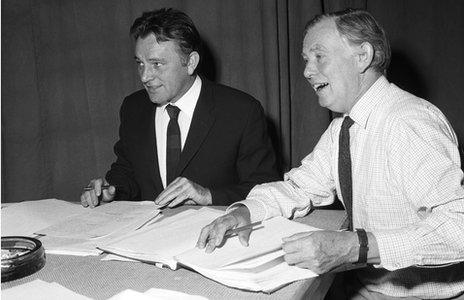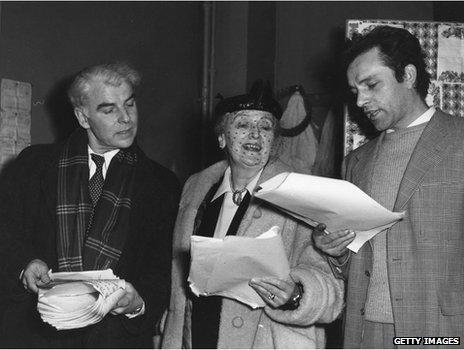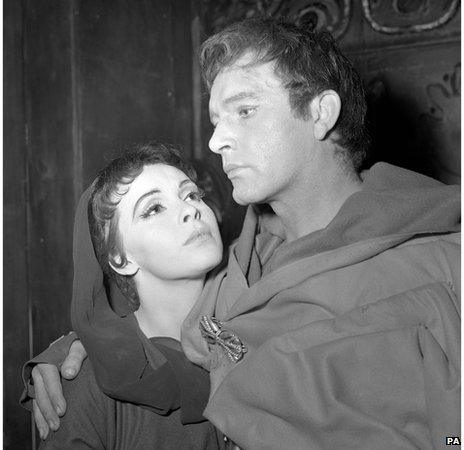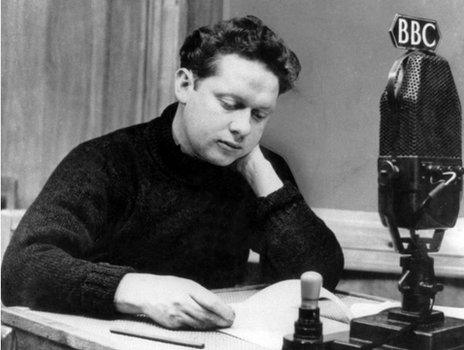Remembering Under Milk Wood at 60
- Published

Richard Burton and BBC producer Douglas Cleverdon recording Under Milk Wood
Sixty years ago this week, the actor Richard Burton starred in what many think the best radio play ever written - Under Milk Wood. In 1954 Burton was just starting a dazzling career as a movie star - but for the rest of his life he looked back on Under Milk Wood as one of his great achievements.
Sunday 24 January 1954 should have been a day of rest for Richard Burton.
The actor was in the middle of a long season starring at the Old Vic theatre in London. The previous evening he'd done Twelfth Night and the company was busy rehearsing Coriolanus, with Burton in the central role.
The coming week involved three performances as Hamlet.
Yet Burton hadn't hesitated to take part in a Sunday night tribute at the Globe Theatre (now the Gielgud) to his fellow Welshman Dylan Thomas.
The poet had died in New York 11 weeks earlier at the age of 39.
Burton, a decade younger, had been shocked at the loss of his friend. At the Globe he read Thomas' poems including the famous Fern Hill.
The rest of Sunday was also taken up with Thomas's unique gifts as a writer.
Burton and an all-Welsh cast spent the day in studio 6A at Broadcasting House rehearsing and recording Under Milk Wood.
It was a radio script which BBC producer Douglas Cleverdon had been coaxing for years from Thomas and which was finally delivered in October 1953, a month before the writer's death.
Burton's role as narrator had been intended for Thomas but he died before the recording could be made.

Emlyn Williams, Sybil Thorndike and Richard Burton rehearsed Under Milk Wood at the Old Vic
With time tight, that day the play was recorded almost as live, with little editing or mixing possible.
It was broadcast the next evening on the BBC Third Programme. It proved an immediate hit with critics and audiences (though some suspected too many blue jokes lurked amid the torrent of language).
To this day you can hear technical faults with Cleverdon's production which were never fixed. But Burton's narration (shared with Richard Bebb) had a rawness which gripped listeners: his unforgettable baritone voice was at its finest.
'Quite extraordinary'
No one remains from the 1954 cast but the actor Robert Hardy remembers attending some of the rehearsals with Burton, with whom he was appearing at the Old Vic. The two had known each other for a decade.
"Rich and I met at Oxford because we were both on a course for the RAF. To start with we disliked each other quite enormously. He thought I was a spoilt child of privilege and I thought him rude and rough and quite untenable.
"Then we discovered we both adored Shakespeare and could quote almost endlessly from any of Shakespeare's history plays. It was the beginning of friendship.
"So there we were at the Old Vic, busy with Hamlet and Coriolanus, when Rich said 'Oh you have to come along to this new play I'm doing for the BBC - it's quite extraordinary and you'll love it'.
"Perhaps Rich thought it might appeal to the Welsh in me but he was right: to sit in on rehearsals and hear that script delivered for the first time was astonishing.
"For my money his Coriolanus at the Old Vic shortly afterwards was a truly great performance - not a term I use lightly. I think the voice he used on radio, which people loved, came in part from his doing great work at the Old Vic.

Claire Bloom starred alongside Richard Burton in Coriolanus at the Old Vic
Born Richard Jenkins, as a young man the actor was unofficially adopted by Philip Burton - a writer and teacher who eventually went to work for the BBC in Wales. Richard came to regard Philip as a mentor and second father.
People often ascribe the power of Richard Burton's voice to his Welshness but Robert Hardy thinks that's a simplification.
"It was always a sort of abandoned Welsh accent. Rich had been influenced by Philip Burton who worked on his voice to give it a degree of expressiveness which at times became almost orchestral.
"You hear that in Under Milk Wood. But it wasn't the way Rich had grown up talking or in fact how anyone in Wales grew up talking."
'Effortless and natural'
In 1963 the BBC broadcast a new version of the play with Richard Burton, now a huge film star, doing the whole narration. The recording is technically cleaner but most critics thought it lacked the energy of the original.
Among the 1963 cast was Welsh actress Dorothea Phillips, now in her eighties. She's one of the few people who remember acting with Burton on radio.
"Obviously Richard had a beautiful voice: it always felt effortless and natural. But I think English people and Americans don't spot that it wasn't really very Welsh.

Burton's role as narrator had been intended for Dylan Thomas but he died before the recording could be made
"There was a tone and a musicality to his voice which was extraordinary. When he spoke he could do almost every note in the scale and make it seem entirely unforced.
"His acting voice was slightly Welsh but it was completely and utterly mesmeric and very expressive.
"Some people said there was a melancholy to Richard's voice but the Welsh are melancholy by nature. It's the quality of hwyl - a word which doesn't quite translate into English. At times Richard had it."
Dotty Phillips thinks the talents of Burton and Dylan Thomas were perfectly matched. "Dylan wasn't even 40 when he died so we'll never know what other collaborations there might have been on radio or in the theatre.
"I remember seeing Richard on stage in the 1950s. In the theatre he had the ability to convince you he was absolutely real. Most actors don't do that.
"Richard was a wonderful reader and actor for radio. Yes the voice was beautiful but that's not all that mattered.
"It was his intelligence: as you listened you knew precisely what he was thinking as you heard the syllables fall. And that is an art."
- Published22 November 2013
- Published21 November 2013
- Published4 June 2013